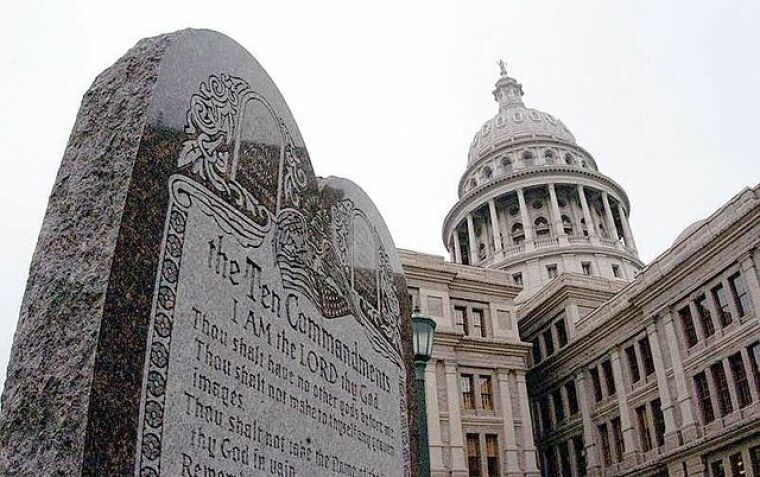New Mexico Ten Commandments display to be moved from city hall to church grounds

A New Mexico group that erected a Ten Commandments monument on the lawn of Bloomfield City Hall has decided to move the display to a local church after a court declared it "unconstitutional."
Last month, the U.S. Supreme Court had declined to hear a case on whether the monument could be displayed on public property, allowing lower court rulings to stand.
Lower courts had ordered its removal from the lawn of the city hall after concluding that it had violated the U.S. Constitution's ban on government endorsing a religion.
The six-foot-tall monument will now be relocated to First Baptist Church of Bloomfield, in part because of its central location in the community.
"It's something that the whole community can enjoy and appreciate," Kevin Mauzy, the founder of the Four Corners Historical Monument Project, told Associated Press.
Mauzy explained that no city money will be spent on relocating the approximately 3,000-pound monument.
The display was erected in 2011 following approval by city council, but its presence at the city hall was challenged by the American Civil Liberties Union (ACLU) in 2012 when two women complained that the monument made them feel "alienated" because they were not Christians.
The city had argued before the court that the monument was historical in nature, while the ACLU contended that the content of the Commandments themselves is blatantly religious.
In 2014, U.S. District Court Judge James Parker ruled that the city should remove the display, arguing that it is "government speech regulated by the Establishment Clause because the Ten Commandments monument is a permanent object located on government property and it is not part of a designated public forum open to all on equal terms."
The Tenth Circuit Court of Appeals upheld the lower court decision in 2016, and last month the U.S. Supreme Court had declined to intervene in the matter.
Attorneys for the city had contended that the Tenth Circuit had ignored previous rulings that simply being offended by such displays did not give someone a legal basis to challenge it.
"Just because we disagree with what something says, does not mean we can ban it from the public square," read a statement from Alliance Defending Freedom, which was helping to represent Bloomfield.
"But by allowing the Tenth Circuit decision to stand, the Supreme Court has given anti-religion advocates a license to challenge any monument that they see and offends them," it continued.
Bloomfield City Manager Eric Strahl stated that First Baptist Church "would be a nice place" to put the Decalogue display.
"It will be positioned so it faces Route 550 so everybody going through that intersection, either going north or south on 550, should be able to see it," he explained.
 Christians don't have to affirm transgenderism, but they can’t express that view at work: tribunal
Christians don't have to affirm transgenderism, but they can’t express that view at work: tribunal Archaeology discovery: Medieval Christian prayer beads found on Holy Island
Archaeology discovery: Medieval Christian prayer beads found on Holy Island Presbyterian Church in America votes to leave National Association of Evangelicals
Presbyterian Church in America votes to leave National Association of Evangelicals Over 50 killed in 'vile and satanic' attack at Nigerian church on Pentecost Sunday
Over 50 killed in 'vile and satanic' attack at Nigerian church on Pentecost Sunday Ukrainian Orthodox Church severs ties with Moscow over Patriarch Kirill's support for Putin's war
Ukrainian Orthodox Church severs ties with Moscow over Patriarch Kirill's support for Putin's war Islamic State kills 20 Nigerian Christians as revenge for US airstrike
Islamic State kills 20 Nigerian Christians as revenge for US airstrike Man who served 33 years in prison for murder leads inmates to Christ
Man who served 33 years in prison for murder leads inmates to Christ


 Nigerian student beaten to death, body burned over ‘blasphemous’ WhatsApp message
Nigerian student beaten to death, body burned over ‘blasphemous’ WhatsApp message 'A new low': World reacts after Hong Kong arrests 90-year-old Cardinal Joseph Zen
'A new low': World reacts after Hong Kong arrests 90-year-old Cardinal Joseph Zen Iran sentences Christian man to 10 years in prison for hosting house church worship gathering
Iran sentences Christian man to 10 years in prison for hosting house church worship gathering French Guyana: Pastor shot dead, church set on fire after meeting delegation of Evangelicals
French Guyana: Pastor shot dead, church set on fire after meeting delegation of Evangelicals ‘Talking Jesus’ report finds only 6% of UK adults identify as practicing Christians
‘Talking Jesus’ report finds only 6% of UK adults identify as practicing Christians Mission Eurasia ministry center blown up in Ukraine, hundreds of Bibles destroyed: 'God will provide'
Mission Eurasia ministry center blown up in Ukraine, hundreds of Bibles destroyed: 'God will provide' Church holds service for first time after ISIS desecrated it 8 years ago
Church holds service for first time after ISIS desecrated it 8 years ago Burger King apologizes for 'offensive campaign' using Jesus' words at the Last Supper
Burger King apologizes for 'offensive campaign' using Jesus' words at the Last Supper Uganda: Muslims abduct teacher, burn him inside mosque for praying in Christ’s name
Uganda: Muslims abduct teacher, burn him inside mosque for praying in Christ’s name